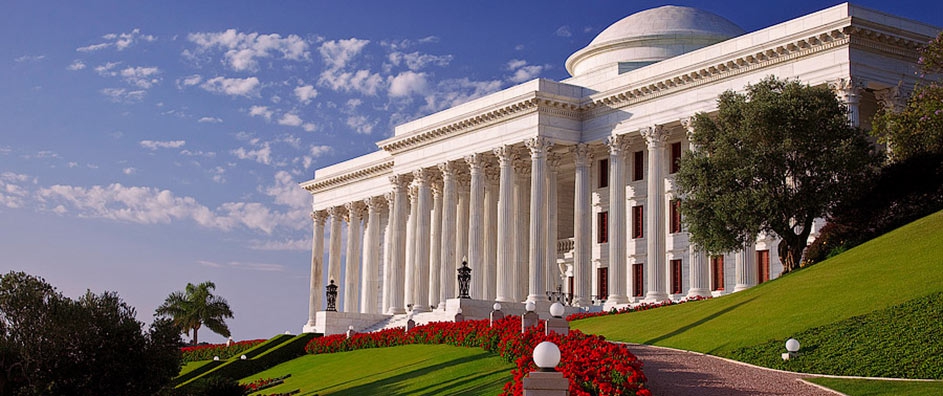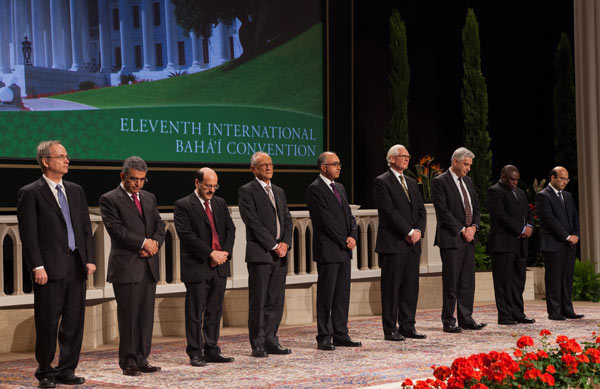The views expressed in our content reflect individual perspectives and do not represent the authoritative views of the Baha'i Faith.
Several contemporary thinkers, scholars and philosophers (who are not Baha’is) have suggested that the Baha’i organizational system – a unified, democratically-elected, non-politicized structure of local, regional, national and international governing bodies – might serve as a model for a future world government; or even someday become that government.
The Unitarian religious scholar and author Alfred W. Martin was one of the first to pose this idea, in his landmark 1926 book Comparative Religion and the Religion of the Future:
It is the crowning glory of the Baha’i movement that, while deprecating sectarianism in its preaching, it has faithfully practiced what it preached by refraining from becoming itself a sect…. Its representatives do not attempt to impose any beliefs upon others, whether by argument or bribery; rather do they seek to put beliefs that have illumined their own lives within the reach of those who feel they need illumination. No, not a sect, not a part of humanity cut off from all the rest, living for itself and aiming to convert all the rest into material for its own growth; no, not that, but a leaven, causing spiritual fermentation in all religions quickening them with the spirit of catholicity and fraternalism. . . . Who shall say but that just as the little company of the Mayflower, landing on Plymouth Rock, proved to be the small beginning of a mighty nation, the ideal germ of a democracy which, if true to its principles, shall yet overspread the habitable globe, so the little company of Baha’is exiled from their Persian home may yet prove to be the small beginning of the world-wide movement, the ideal germ of democracy in religion, the Universal Church of Mankind? – pp. 88, 91.
However, as we’ve already discovered in this series of articles, the Baha’i writings specifically prohibit the Baha’i Administrative Order from “supersed(ing) the government of their respective countries.”
To clear up any confusion, Abdu’l-Baha wrote a weighty treatise on this subject called the Resaleh-ye Siyasiyyeh, which different translators have rendered in French as La Politique (The Political), or in German as Eine Abhandlung Uber Politik (An Essay on Politics). The various translators substantially agree on the main thrust of this important Baha’i work – that the functions of religious leaders and the functions of political leaders should remain separate. In his treatise Abdu’l-Baha clearly says that whenever the leaders of religion seek a role in the political sphere, it dissolves the unity of the faithful believers – and he warns the Baha’is not to seek those roles.
But let’s speculate for a minute. What if the believers or the religion itself didn’t seek that role? What if the larger society freely chooses to be administered and governed by that religion’s principles, or uses its administrative order as a model for its civil government?
In other words, could the Baha’i mode of governance, its globally-unified democratic administrative order, ever become more than just a model for a civil government? Could the Baha’i Faith someday become the state religion of a country? Might that country adopt Baha’i laws as its own? Could a nation – or the world — actually utilize the Baha’i administrative order as its governing body at some distant point in the future?
Yes, the Universal House of Justice has said, all of those things could conceivably happen, in a distant, completely de-politicized and unified future state of society. But the Baha’is themselves could not seek out any of those possibilities – that radical shift in society’s direction would have to be the free and unencumbered choice of the society itself. So while such a development seems remote and almost inconceivable now, the Universal House of Justice says it could one day occur:
In light of these facts alone it is evident that the growth of the Baha’i communities to the size where a non-Baha’i state would adopt the Faith as the State Religion, let alone to the point at which the State would accept the Law of God as its own law and the National House of Justice as its legislature, must be a supremely voluntary and democratic process. – Separation of Church and State, from The Universal House of Justice, April 27, 1995.
Let’s try to imagine it. Given a new, post-secular model of harmony and complementarity between a pluralist religious order and the state, working in different ways for the welfare of humanity; and given a unified world commonwealth with a federated national system; and maybe even given a majority Baha’i population, (or at least support for Baha’i ideals from a majority of the population), that “supremely voluntary and democratic process” would have to incorporate two critical factors: complete protection for the rights of any minorities; and the substantial free and willing agreement of that entire future society in adopting Baha’i principles.
This unprecedented type of governmental and spiritual shift, so difficult to foresee now, with our contemporary world such a completely dis-unified tangle of competing interests, policies and national agendas, would obviously require a major realignment of values, geopolitical interests and religious perspectives. Barring an abrupt or catastrophic shift in the world’s fortunes, it would likely take a very long time, perhaps centuries, to reach the stage of collective human maturation required for such peaceful, democratic agreement on a unifying set of spiritual principles.
Meanwhile, the main goal of the Baha’i Faith, regardless of how it comes about or what form it might eventually take, will always center around one ultimate aim – the peaceful unification of the entire human race.
You May Also Like
Comments


















"Let them beware lest, in their eagerness to further the aims of their beloved Cause, they should be led .... to compromise with their essential principles, ...
Let them proclaim that ... they will, unhesitatingly, subordinate the operation of such laws and the application of such principles to the requirements and legal enactments of their respective governments. Theirs is not the purpose, while endeavoring to conduct and perfect the administrative ...affairs of their Faith, to violate, under any circumstances, the provisions of their country's constitution, much less to allow the machinery of their administration to supersede the government of their respective countries.
(Shoghi Effendi, The World Order of Baha'u'llah, p. 65)
There are therfore no imaginable circumstances in which Bahais could allow the machinery of their administration to supersede the national government. If they did, they would not be Bahais, for a Bahai does not compromise essential Bahai principles. There are numerous other passages in the Bahai writings that specifically exclude the Bahai administration from ever becoming a government, however voluntary the process might be:
Abdu’l-Baha wrote:
“Should they place in the arena the crown of the government of the whole world, and invite each one of us to accept it, undoubtedly we shall not condescend, and shall refuse to accept it.” ( Tablets of the Divine Plan 51)
The signature of that meeting should be the Spiritual Gathering (House of Spirituality) and the wisdom therein is that hereafter the government should not infer from the term “House of Justice” that a court is signified, that it is connected with political
affairs, or that at any time it will interfere with governmental affairs. … (Tablets of Abdu’l-Baha Abbas vol. 1, page 5).
And in an authenticated talk Abdu’l-Baha gave in London on 3 October 1911, he says:
The ninth [teaching of Baha'u'llah]: religion is separated from politics: religion does not enter into political matters, in fact, it is linked with the hearts, not with the world of bodies. The leaders of religion should devote themselves to teaching and training the souls and propagating good morals, and they should not enter into political matters.
A letter on behalf of Shoghi Effendi states:
“The Administrative Order is not a governmental or civic body, it is to regulate and guide the internal affairs of the Bahá’í community;
consequently it works, according to its own procedure, best suited to its needs." (on behalf of Shoghi Effendi, in Messages to Canada, 276)
If the Bahai Administration were to become a government, it would have to change its procedures, and its very character. The Bahai institutions, and eventually the Faith itself, would be harmed.